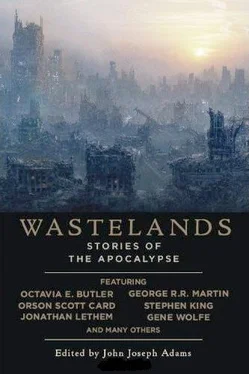They retreated to their horses. Quait packed his spade behind his saddle and mounted in that awkward way that always left her wondering whether Lightfoot would chuck him off on the other side.
She stood looking up at him.
“What’s wrong?” He wiped the back of his hand against his cheek. His hat was jammed down on his head. Water spilled out of it onto his shoulders.
“It’s time to give it up,” Chaka said. “Go home. If we can.” Thunder rumbled. It was getting very dark.
“Not the best time to discuss this.” Quait waited for her to get on her horse. The rain pounded the soft earth, fell into the trees.
She looked back toward the grave. Flojian lay with the ruins now, buried like them beneath the rolling hills and the broad forest. It was the sort of grave he would have preferred, she supposed. He liked stuff that had been dead a long time. She pulled her jacket tight and climbed into the saddle. Quait moved off at a brisk trot.
They’d buried him at the top of the highest ridge in the area. Now they rode slowly along the crest, picking their way among broken concrete casts and petrified timbers and corroded metal, the detritus of the old world, sinking slowly into the ground. The debris had been softened by time: earth and grass had rounded the rubble, spilled over it, absorbed its sharp edges. Eventually, she supposed, nothing would be left, and visitors would stand on the ruins and not know they were even here.
Quait bent against the rain, his hat pulled low over his eyes, his right hand pressed against Lightfoot’s flank. He looked worn and tired and discouraged, and Chaka realized for the first time that he too had given up. That he was only waiting for someone else to take responsibility for admitting failure.
They dropped down off the ridge, and rode through a narrow defile bordered by blocks and slabs.
“You okay?” he asked.
Chaka was fine. Scared. Exhausted. Wondering what they would say to the widows and mothers when they got home. There had been six when they started. “Yes,” she said. “I’m okay.”
The grotto lay ahead, a square black mouth rimmed by chalkstone and half-hidden by a bracken. They’d left a fire burning, and it looked warm and good. They dismounted, and led their horses inside.
Quait threw a couple of logs onto the blaze. “Cold out there,” he said.
Lightning flashed in the entrance.
They put the teapot onto its boiling rock, fed and watered the animals, changed into dry clothes, and sank down in front of the fire. They didn’t talk much for a long time. Chaka sat, wrapped in a blanket, enjoying being warm and away from the rain.
Quait made some notes in the journal, trying to establish the site of Flojian’s grave, so that future travelers, if there were any, could find it. After a while he sighed and looked up, not at her, but over her shoulder, into the middle distance. “You really think we should turn around?”
“Yeah. I think we’ve had enough. Time to go home.”
He nodded. “I hate to go back like this.”
“Me too. But it’s time.” It was hard to guess what the grotto had been. It was not a cave. The walls were artificial. Whatever color they might once have possessed had been washed away. Now they were gray and stained, and they curved into a high ceiling. A pattern of slanted lines, probably intended for decorative effect, cut through them. The grotto was wide, wider than the council hall, which could accommodate a hundred people; and it went far back under the hill. Miles, maybe.
As a general principle, she avoided the ruins when she could. It wasn’t easy because they were everywhere. But all sorts of critters made their homes among them. And the structures were dangerous, as Flojian had found out. Prone to cave-ins, collapsing floors, you name it. The real reason, though, was that she had heard too many stories about spectres and demons among the crumbling walls. She was not superstitious, and would never have admitted her discomfort to Quait. Still, you never knew.
They had found the grotto a few hours after Flojian got hurt, and moved in, grateful for the shelter. But she was anxious to be gone now.
Thunder shook the walls, and they could hear the steady rhythm of rainwater pouring off the ridge. It was still late afternoon, but all the light had drained out of the day.
“Tea should be ready,” said Chaka.
Quait shook his head. “I hate to give it up. We’ll always wonder if it might have been over the next hill.”
She had just picked up the pot and begun to pour when a bolt exploded directly overhead. “Close,” she said, grateful for the protection of the grotto.
Quait smiled, took his tea, and lifted it in a mock toast to whatever powers lived in the area. “Maybe you’re right,” he said. “Maybe we should take the hint.”
The bolt was drawn by a corroded crosspiece, a misshapen chunk of dissolving metal jutting from the side of the hill. Most of the energy dissipated into the ground. But some of it leaped to a buried cable, followed it down to a melted junction box, flowed through a series of conduits, and lit up several ancient circuit boards. One of the circuit boards relayed power into a long-dormant auxiliary system; another turned on an array of sensors which began to take note of sounds in the grotto. And a third, after an appropriate delay, threw a switch and activated the only program that still survived.
They ate well. Chaka had come across an unlucky turkey that morning, and Quait added some berries and fresh-baked biscuit. They’d long since exhausted their store of wine, but a brook ran through the grotto about sixty yards back, and the water was clear and cold.
"It’s not as if we have any reason to think we’re close," said Chaka. "I’m not sure I believe in it anyway. Even if it is out there, the price is too high."
The storm eased with the coming of night. Rain still fell steadily, but it was light rain, not much more than mist.
Quait talked extensively through the evening, about his ambitions, about how important it was to find out who had built the great cities scattered through the wilderness, and what had happened to them, and about mastering the ancient wizardries. But she was correct, he kept saying, glancing her way, pausing to give her a chance to interrupt. It was better to be safe than sorry. "Damn right," said Chaka.
It was warm near the fire, and after a while Quait fell asleep. He’d lost twenty pounds since they’d left Illyria ten weeks before. He had aged, and the good-humoured nonchalance that had attracted her during the early days had disappeared. Quait was all business now.
She tried to shake off her sense of despair. They were a long way from home, alone in a wilderness filled with savages and demons and dead cities in which lights blinked and music played and mechanical things moved. She shrank down in her blankets and listened to the water dripping off the trees. A log broke and fell into the fire.
She was not sure what brought her out of it, but she was suddenly awake, senses alert.
Someone, outlined in moonlight, illuminated from behind by the fire, was standing at the exit to the grotto, looking out. Beside her, Quait’s chest gently rose and fell.
She was using her saddle bag for a pillow. Without any visible movement, she eased her gun out of it.
The figure appeared to be a man, somewhat thick at the waist, dressed in peculiar clothes. He wore a dark jacket and dark trousers of matching style, a hat with a rounded top, and he carried a walking stick. There was a red glow near his mouth that alternately dimmed and brightened. She detected an door that might have been burning weed.
"Don’t move," she said softly, rising to confront the apparition. "I have a gun."
He turned, looked curiously at her, and a cloud of smoke rose over his head. He was indeed puffing on something. And the smell was vile. "So you do," he said. "I hope you won’t use it."
Читать дальше












